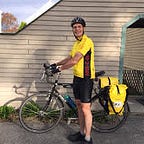Father’s Day
I’ve been on the receiving end of Father’s Day for thirty years now; my children were born in 1989 and 1990; my own father died in 1994. Dad’s been gone so long that weeks, months can pass and he doesn’t cross my mind. Until something jiggers a memory and there he is again: Jack Fallon, Black Irish to the core.
Molly McCloskey’s profile of her father, Jack McCloskey (The New Yorker, June 3, 2024) drew enough parallels to bring my own father back, rich in memory.
Jack McCloskey was the General Manger of the Detroit Pistons when the “Bad Boys” of the NBA edged out darlings like Michael Jordan and Magic Johnson to win the Championship in 1989 and 1990. Jack Fallon never did anything quite so notable, though he was a founding fanatic that transformed Toms River, New Jersey into a Little League baseball powerhouse that eventually won multiple state titles and the Little League World Series.
Molly was the last of six children, a basketball striver with talent; always reaching for, though never quite attaining, her father’s affection. I was the fourth of five, with no athletic talent, also striving for my dad’s affection. Until I endured so many humiliating strike-outs and got hit by so many baseballs I swallowed my miscoordination and handed in my glove.
Jack McCloskey left his family; growing up, Molly barely saw him. Jack Fallon left his family after we kids were gone; then years went by without contact.
Molly and Jack had a rapprochement, of sorts, when her dad slid into dementia. As he fell away, she became more interested in what she’d missed, reached out to players he’d coached, and discovered a man she never knew. Warm. Concerned. Present.
My dad and I had no grand rapprochement; we’d never fallen that far apart. We did, however, have an affecting final meeting. One that Molly’s article brought clear back to me.
It was the fall of 1993. My father had returned to his native New Jersey, after hauling the entire family to Oklahoma twenty years earlier (that’s a whole other story). He was dying of pancreatic cancer. His second wife, better suited to him than our mother, took great care. I’d come out as a gay man that spring. Flew to Oklahoma in the summer to tell my mother and siblings in person. And decided that, even though my father might be quite content to go to his grave without this particular bit of news, I wanted to tell him, in person, as well. So I invited myself to his home and drove across four states to spend a few hours delivering my news.
“Well, that explains baseball,” was Dad’s first response to learning that I’m gay. Immediately followed by, “It’s God’s way of dealing with population control.” I had to give the guy credit for his unique take on my life, though I declined to counter with the fact that I’d fathered two children. Children whom, multiple invitations notwithstanding, he’d never seen.
About that moment, two paintings posted on the wall above a corner desk caught my eye. My father was a copyist. He recreates photos in acrylic: part caricature; part art. I’d seen his Johnny Carson, Bob Hope, Phyllis Diller. Entertainers he loved. But here were two fresh portraits, created from photos I’d sent. My children.
I was impressed that my father had spent hours creating likeness of his grandchildren, though heartbroken that he was incapable of actually seeing them in person. As if his brushstrokes tried to satisfy an intimacy he himself could not actualize.
That moment crystallized the limits of my father’s capacity to love. Somehow, these expressions of love, created at a distance, clarified the triangle of me and my father and baseball. How I’d witnessed him jostle his players, pat them on the head, spur them to victory, be present for them in ways he never was with me. They were his true kin, the apples of his eye. I was blood related, yet utterly different.
It would be too strong to say I felt unloved growing up. I didn’t feel much of anything. I was neither neglected nor abused. I was simply there. Unsatisfactory. Uncoordinated. Incomplete. A genetic fluke born into the wrong family. I always thought the deficiency was mine, until I gazed at the portraits of grandchildren he’d never see, and understood that my father lacked something fundamental. A man who’d severed ties with his own parents, his own brother, his own sister. Then severed ties with his own children and now his grandchildren.
In that moment, my heart opened up to him. I decided that he loved me, and my children, as much as he possibly could. It is not for me to begrudge how meagerly it manifested.
In Molly McCloskey’s essay, she comes to accept her father’s limited love; even as he’s able to better express abundant love to his players. Her profound words triggered emotions in me at an opportune time. My son and his wife are expecting; I hope to be a grandfather in September. I don’t plan to draw pictures of my grandson. I plan to break out of the constrictions that plagued me and my father and his parents. To be there for my son and grandson at the glorious event, and all the days after. Present.
